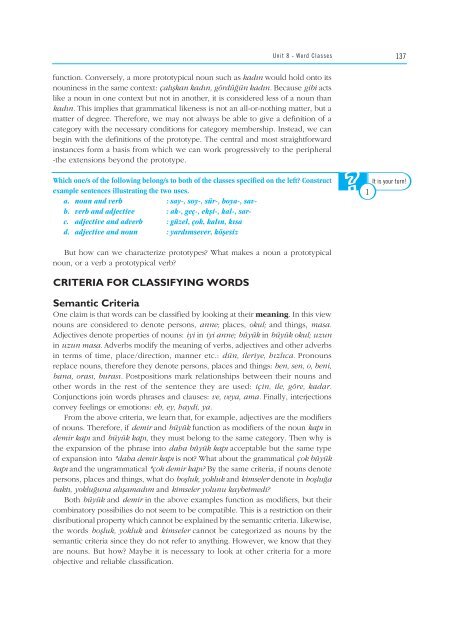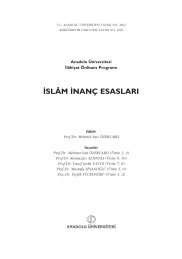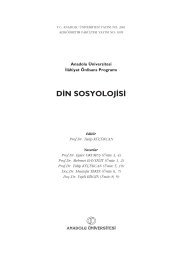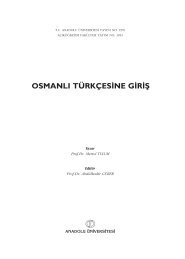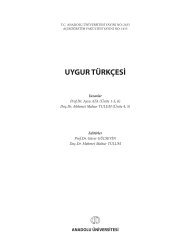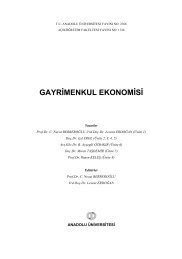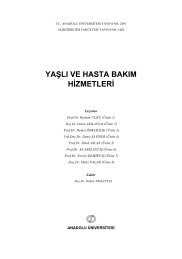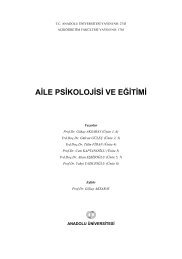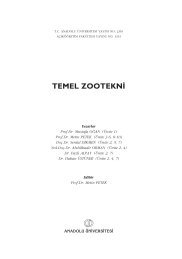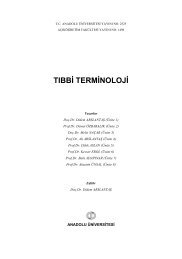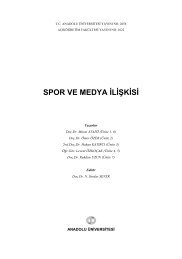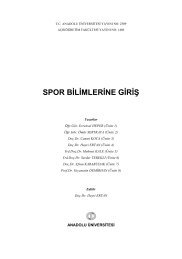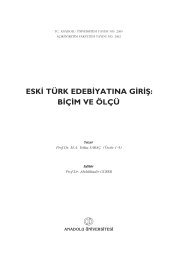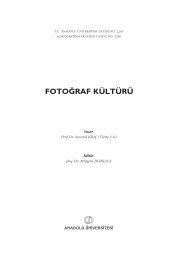turkish phonology and morphology (türkçe ses ve b‹ç‹mb‹lg‹s‹)
turkish phonology and morphology (türkçe ses ve b‹ç‹mb‹lg‹s‹)
turkish phonology and morphology (türkçe ses ve b‹ç‹mb‹lg‹s‹)
Create successful ePaper yourself
Turn your PDF publications into a flip-book with our unique Google optimized e-Paper software.
function. Con<strong>ve</strong>rsely, a more prototypical noun such as kad›n would hold onto its<br />
nouniness in the same context: çal›flkan kad›n, gördü¤ün kad›n. Because gibi acts<br />
like a noun in one context but not in another, it is considered less of a noun than<br />
kad›n. This implies that grammatical likeness is not an all-or-nothing matter, but a<br />
matter of degree. Therefore, we may not always be able to gi<strong>ve</strong> a definition of a<br />
category with the necessary conditions for category membership. Instead, we can<br />
begin with the definitions of the prototype. The central <strong>and</strong> most straightforward<br />
instances form a basis from which we can work progressi<strong>ve</strong>ly to the peripheral<br />
-the extensions beyond the prototype.<br />
Which one/s of the following belong/s to both of the clas<strong>ses</strong> specified It is on your the turn! left? Construct<br />
It is your turn!<br />
example sentences illustrating the two u<strong>ses</strong>.<br />
1 1<br />
a. noun <strong>and</strong> <strong>ve</strong>rb : say-, soy-, sür-, boya-, savb.<br />
<strong>ve</strong>rb <strong>and</strong> adjecti<strong>ve</strong><br />
c. adjecti<strong>ve</strong> <strong>and</strong> ad<strong>ve</strong>rb<br />
d. adjecti<strong>ve</strong> <strong>and</strong> noun<br />
: ak-, geç-, ekfli-, kal-, sar-<br />
: güzel, çok, kal›n, k›sa<br />
: yard›mse<strong>ve</strong>r, köflesiz<br />
It is your turn!<br />
2<br />
It is your turn!<br />
2<br />
It is your turn!<br />
It is your turn!<br />
But how can we characterize prototypes? What makes a noun a prototypical<br />
noun, or a <strong>ve</strong>rb a prototypical <strong>ve</strong>rb?<br />
3 3<br />
CRITERIA FOR CLASSIFYING WORDS<br />
Semantic Criteria<br />
Unit 8 - Word Clas<strong>ses</strong><br />
One claim is that words can be classified by looking at their meaning. It is your turn! In this view<br />
It is your turn!<br />
nouns are considered to denote persons, anne; places, okul; <strong>and</strong> things, 5 masa.<br />
Adjecti<strong>ve</strong>s denote properties of nouns: iyi in iyi anne; büyük in büyük okul; uzun<br />
5<br />
in uzun masa. Ad<strong>ve</strong>rbs modify the meaning of <strong>ve</strong>rbs, adjecti<strong>ve</strong>s <strong>and</strong> other ad<strong>ve</strong>rbs<br />
It is your turn!<br />
in terms of time, place/direction, manner etc.: dün, ileriye, h›zl›ca. Pronouns<br />
6<br />
replace nouns, therefore they denote persons, places <strong>and</strong> things: ben, sen, o, beni,<br />
bana, oras›, buras›. Postpositions mark relationships between their nouns <strong>and</strong><br />
It is your turn!<br />
6<br />
other words in the rest of the sentence they are used: için,<br />
It is your<br />
ile,<br />
turn!<br />
göre, kadar.<br />
It is your turn!<br />
Conjunctions join words phra<strong>ses</strong> <strong>and</strong> clau<strong>ses</strong>: <strong>ve</strong>, <strong>ve</strong>ya, ama. Finally, interjections 7<br />
con<strong>ve</strong>y feelings or emotions: eh, ey, haydi, ya.<br />
7<br />
From the abo<strong>ve</strong> criteria, we learn that, for example, adjecti<strong>ve</strong>s It is your are turn! the modifiers<br />
It is your turn!<br />
of nouns. Therefore, if demir <strong>and</strong> büyük function as modifiers of the noun 8 kap› in<br />
demir kap› <strong>and</strong> büyük kap›, they must belong to the same category. Then why is<br />
8<br />
the expansion of the phrase into daha büyük kap› acceptable It is but your turn! the same type<br />
It is your turn!<br />
of expansion into *daha demir kap› is not? What about the grammatical çok<br />
9<br />
büyük<br />
kap› <strong>and</strong> the ungrammatical *çok demir kap›? By the same criteria, if nouns denote<br />
9<br />
persons, places <strong>and</strong> things, what do boflluk, yokluk <strong>and</strong> kimseler denote in bofllu¤a<br />
It is your turn!<br />
bakt›, yoklu¤una al›flamad›m <strong>and</strong> kimseler yolunu kaybetmedi?<br />
10<br />
Both büyük <strong>and</strong> demir in the abo<strong>ve</strong> examples function as modifiers, but their<br />
combinatory possibilies do not seem to be compatible. This is a restriction on their<br />
It is your turn!<br />
10<br />
disributional property which cannot be explained by the semantic It is your criteria. turn! Likewise,<br />
It is your turn!<br />
the words boflluk, yokluk <strong>and</strong> kimseler cannot be categorized as nouns 11 by the<br />
semantic criteria since they do not refer to anything. Howe<strong>ve</strong>r, we know that they<br />
11<br />
are nouns. But how? Maybe it is necessary to look at other It is criteria your turn! for a more<br />
objecti<strong>ve</strong> <strong>and</strong> reliable classification.<br />
12<br />
It is your turn!<br />
12<br />
137<br />
It is your turn!<br />
It is your turn!<br />
4 4<br />
It is your turn!<br />
It is your turn!<br />
13 13


